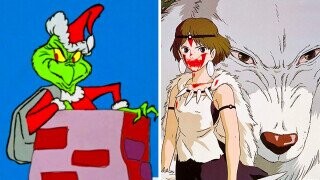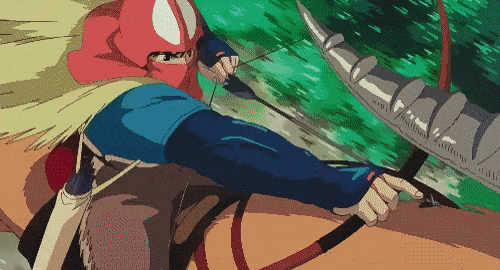Are Dr. Seuss and Hayao Miyazaki Actually the Same Person…?

When talking about Dr. Seuss and Japan, it'd be weird not to kick your childhood in the nutsack by mentioning that the beloved children's writer drew some despicably racist anti-Japanese cartoons during WWII and even defended the internment of Japanese-Americans. He later had a change of heart and wrote Horton Hears a Who! as an apology for the things he said about Japanese people and not, as too many people think, as an anti-abortion parable. The first clue was probably him dedicating the book to "My Great Friend, Mitsugi Nakamura," the dean of Doshisha University in Kyoto.
Whether this was enough to redeem him is up to you, but that's not what we're here to talk about today. We are here because, no, really, we suspect that Dr. Seuss and Hayao Miyazaki, possibly the greatest anime director ever and co-founder of Studio Ghibli, might secretly be the same person. Which is just our pop-culture-disordered brain's way of saying that there are some fascinating similarities between the two artists. Exhibit A:

catwalker/Shutterstock.com, 文部科学省ホームページ
Also, both men kinda hated the world and themselves.
Don't Miss
While a lot of Miyazaki's works are family productions that anyone can enjoy, like My Neighbor Totoro, his magnum opus is arguably the very violent and adult epic fantasy Princess Mononoke. The first clue to it not really being for kids might be a scene early on where a dude has both of his arms sliced clean off by an arrow.

It was crazy awesome and badass, but that's not really the mood Miyazaki was going for with this movie. The story of Princess Mononoke focused on a prince trying to cure himself of a curse but was ultimately about the struggle between humans and the world of nature, and, boy howdy is it clear which side Miyazaki was on.
Besides scenes of clearcutting forests and a boar god turning into a monster because of human technology, Princess Mononoke also had a character literally kill the spirit of the forest. In the end, the message of the movie seems to be that all humans, Miyazaki included, are all idiots for not being born trees because all we do is take things that are pure and good and destroy them. He has been making claims like that for a long time now.
And yet, without spoiling anything, the ending of Princess Mononoke is … not exactly happy, but it shows at least a begrudging agreement that even in the whole ugly mess of humanity, there is potential for goodness. Miyazaki literally spelled it out in a 1995 memo for the movie, writing:
" amid the hatred and slaughter … It is possible for wonderful encounters to occur and for beautiful things to exist. I will depict hatred, but only to show that there is something more valuable."
In a way, it's almost like Miyazaki made Mononoke to convince himself that humanity might not be a total loss. That's what makes the movie so similar to How the Grinch Stole Christmas.
See, Dr. Seuss apparently based the titular Grinch on himself after one day waking up and realizing that boy howdy does he hate people for how they ruined and commercialized Christmas. He quickly got to work putting those feelings into rhyme, pouring all of himself into the original Green Meanie. He'd later say that it was the easiest bit of writing he ever did as apparently Seuss had felt frustrated with humans for a very long time and was just looking for an excuse to unload on us. That would explain why he made the misanthropic Grinch the same age as him when he wrote the story (53).
This also made writing the ending difficult for Seuss. The hatred part was easy, but he struggled for THREE MONTHS to come up with the right conclusion to the story. In the end, similarly to Miyazaki, he settled on a bit of ambiguity, with the Grinch/Seuss concluding that "maybe Christmas, perhaps, means a little bit more."
And, yes, the Grinch's heart does grow three sizes, but considering how much of the story came from Seuss' anger, the words "maybe" and "perhaps" in that famous quote start to sound a lot like the author trying to convince himself not to give up on our species. The ending is hopeful but ultimately uncertain, and the only note Miyazaki probably would have had for it is "Maybe have one of the Whos lose a limb or two? Just a thought!"
Follow Cezary on Twitter.
Top Image: MGM Television, Studio Ghibli